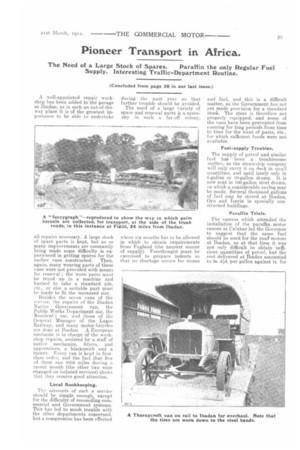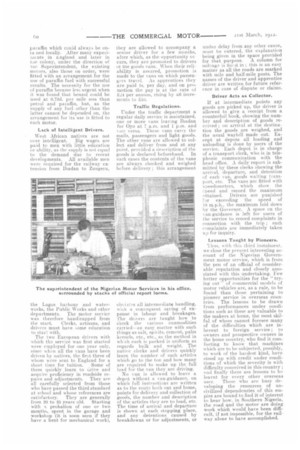Pioneer Transport in Africa.
Page 15

Page 16

If you've noticed an error in this article please click here to report it so we can fix it.
The Need of a Large Stock of Spares. Paraffin the only Regular Fuel Supply. Interesting Traffic-Department Routine.
A well-appointed repair workshop has been added to the garage at Ibadan, as in such an out-of-theway place it is of the greatest importance to be able to undertake
all repairs necessary. A large stock of spare parts is kept, but as so many improvements are constantly being made some difficulty is experienced in getting spares for the earlier vans constructed. Then, again, many wearing parts of these vans were not provided with means for renewal ; the worn parts must be trued up in a. machine and bushed to take a standard pin, etc., or else a, suitable part must be made to fit the increased size.
Besides the seven vans of the service, the repairs of the Ibadan Native Government van, the Public Works Department car, the Resident's car, and those of the General Manager of the Lagos Railway, and many motor-bicycles are done at, Ibadan. A European mechanic is in charge of the workshop repairs, assisted by a staff of native mechanics, _ fitters, and apprentices, a blacksmith and a turner. Every van is kept in firstclass order, and the fact, that. five of them ran 6250 miles during a recent. month (the other two were engaged on isolated services) shows that they receive good attention.
Local Bookkeeping.
The accounts of such a service should be simple enough, except for the difficulty of reconciling commercial and Government systems. This has led to much trouble with the other departments concerned, but a compromise has been effected during the past year so that further trouble should be avoided.
The need of a large variety of spare and renewal parts is a, necessity in such a far-off colony, where six months has to be allowed in which to obtain requirements from England (the nearest source of supply). Forethought must he exercised to prepare indents so that no shortage occurs for stores and fuel, and this is a difficult matter, as the Government has not yet made provision for a standard stock.The store is therefore not properly equipped, and some of the vans have been prevented from running for long periods from time to time for the want of parts, etc., for which sufficient funds were not available.
Fuel-supply Troubles.
The supply of petrol and similar fuel has been a troublesome matter, as the steamship company will only carry it on deck in small quantities, and until lately only in 5-gallon or 10-gallon drums. It is now sent in 100-gallon steel drums, on which a considerable saving may be made. Several thousand gallons of fuel may be stored at Ibadan, Oyo and Iseyin in specially constructed buildings.
Paraffin Trials.
The success which attended the installation of the paraffin motor canoes at Calabar led the Governor to suggest that the same fuel should be used for the road motors at Ibadan, as at that time it was not only difficult to obtain sufficient quantities of petrol, but the cost delivered at Ibadan amounted to 38. VA. per gallon against Is. for
paraffin which could always be obta tied locally. After many expel imints in rengland and later in toe colony, under the direction of toe Superintendent, the existing motors, also those on order, were .fitted with an arrangement for the use of paraffin fuel with successful results. The necessity for the use of paraffin became lest; urgent when it was found that benzol could be used at 0.73d. per mile less than petrol and paraffin, but, as the supply of any fuel other than the latter cannot be depended on, the arrangement for its use is fitted to each motor.
Lack of Intelligent Drivers.
West African natives are not over intelligent. Big wages are paid to men with little education or ability, as the supply is not equal to the demand due to recent developments. All available men were required for the railway extension from Madan to Zungeru, the Lagos harbour and waterworks, the Public Works and other departments. The motor service was therefore handicapped from the start. Clerks, artisans, and drivers must have some education to start with.
The two European drivers with which the service was first started were employed for one year only, since when all the vans have been driven by natives, the first three of whom were sent to England for a short time for tuition. Some of them quickly learn to wive and acquire proficiency in roadside repairs and adjustments. They are all carefully selected from those who have passed the third standard at school and whose references are
satisfactory. They are generally from 20 to 25 years old. Starting with a probation of one or two months, spent in the garage and workshop (it is soon seen if they have a bent for mechanical work),
they are allowed to accompany a senior driver for a few months, after which, as the opportunity etc curs, they are promoted to drivers ot the goods vans. When their reliability is assured, promotion is made to the vans on which passengers travel. As apprentices they are paid is. per day, and on promotion the pay is at the rate of
4 per annum, rising by a increments to £.54.
Traffic Regulations.
Under the traffic department a regular daily service is maintained, one or more vans leaving Ibadan for Oyo at 7 a.m. and 1 p.m. and vice versa. These vans care), the mails, passengers and light goods. The other vans are allowed to collect and deliver from and at any point, provided a description of the goods is declared beforehand. In such eases the contents of the vans are always checked and weighed before delivery ; this arrangement obi ietes all intermediate handling, with a. consequent saving of expense in labour and breakages. The drivers are taught how to check the various commodities carried—an easy matter with such things as salt, spirits, cement, palm kernels, etc., etc., as the method in wh:ch each is packed is uniform as regards bulk and weight. The native clerks and drivers quickly learn the number of such articles which go to the ton and how many are required to make up the full load for the van they are driving.
No van is allowed to leave a depot without a van-guidance, on which full instructions are written as to the route both out and home, points for delivery and collection of goods, the number and description of the articles they are to load, etc. The time of arrival and departure is shown at each slopping place, and any detentions caused by breakdowns or for adjustments, or
undue delay from any other cause, must be entered, the explanation being given in the space provided
for that purpose. A. column for mileage is filled in; this is an easy matter as all the roads are marked with mile and half-mile posts. The names of the driver and apprentice driver are written for future reference in ease of dispute or claims.
Driver Acts as Collector.
If at intermediate points any goods are picked up, the driver is allowed to give. a receipt from a counterfoil book, showing the number and description of goods received; on arrival at the destination the goods are weighed, and the usual waybill made out. Except at depots all loading and unloading is done by users of the service. Each depot is in charge of a transport clerk, who is in telephonic communication with the head office. A daily report is submitted by these clerks showing the arrival, departure, and detention of each van, goods waiting transport, etc. The vans are fitted with speedometers, which show the epeed and record the maximum Pttaineci. Drivers are punished f;)r exceeding the speed of 10 m.p.h., the maximum laid down by the Governor. A space on the van-guidance is left for users of the service to record complaints in connection with the trip ; such remplaints are immediately taken up for inquiry.
Lessons Taught by Pioneers,
lims, with this third instalment, we close the present interesting account of the Nigerian Government motor service, which is from the pen of an official of considerable reputation and closely associated with this undertaking. Few better opportunities for the "trying out '' of commercial models of motor vehicles are, as a rule, to be found than those pertaining to pioneer service in overseas countries. The lessons to be drawn from performances under conditions such as these are valuable to the makers at home, the most skilful of whom cannot foresee many of the difficulties which are inherent to foreign service ; to owners and prospective owners in the home country, who find it comforting to know that machines which are to be subjected, possibly, to work of the hardest kind, have stood up with credit under conditions of which the severity is with difficulty conceived in this country ; and finally there are lessons to be learnt for every other overseas t1S1'1'. Those who are busy developing the resources of uneivilized dependencies of this empire are bound to find it of interest to hear how, in Southern Nigeria, the road and the motor are doing work which would have been difficult, if not impossible, for the railway alone to have accomplished.




















